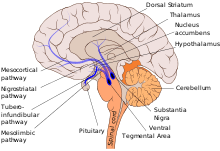Tuberoinfundibular pathway
The tuberoinfundibular pathway refers to a population of dopamine neurons that project from the arcuate nucleus (a.k.a. the "infundibular nucleus") in the tuberal region of the hypothalamus to the median eminence.[1] It is one of the four major dopamine pathways in the brain. Dopamine released at this site inhibits the secretion of prolactin from anterior pituitary gland lactotrophs by binding to D2 receptors.

Tuberoinfundibular pathway shown in opaque blue, connecting that hypothalamus with the pituitary gland.
Some antipsychotic drugs block dopamine in the tuberoinfundibular pathway, which can cause an increase in the amount of prolactin in the blood (hyperprolactinemia).
Other dopamine pathways
Other major dopamine pathways include:
gollark: Someone else did a similar thing, look up factorio cellular automaton or something.
gollark: It's actually really simple.
gollark: Maybe tomorrow.
gollark: It only replicates in one direction and causes much lag.
gollark: It's very easy with the recursive blueprints mod.
See also
References
- Malenka RC, Nestler EJ, Hyman SE (2009). "Chapter 10: Neural and Neuroendocrine Control of the Internal Milieu". In Sydor A, Brown RY (eds.). Molecular Neuropharmacology: A Foundation for Clinical Neuroscience (2nd ed.). New York: McGraw-Hill Medical. p. 249. ISBN 9780071481274.
Relationship of the hypothalamus and the pituitary gland. The anterior pituitary, or adenohypophysis, receives rich blood flow from the capillaries of the portal hypophyseal system. This system delivers factors released by hypothalamic neurons into portal capillaries at the median eminence. The figure shows one such projection, from the tuberal (arcuate) nuclei via the tuberoinfundibular tract to the median eminence.
External links
This article is issued from Wikipedia. The text is licensed under Creative Commons - Attribution - Sharealike. Additional terms may apply for the media files.